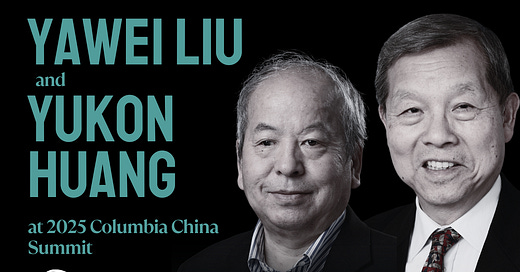Below is a complete transcript of the episode. Thanks to CadreScripts for their great work, to Lili Shoup for checking and formatting, and to Zhou Keya for the image! Listen in the embedded player above.
Kaiser: Welcome to this special live edition of the Sinica Podcast, coming to you from the 2025 Columbia China Summit at Columbia University. Hello, New York! Let’s hear you make a little noise.
Thank you so much to Aiden, to Zhang Yu, to Annie Cui for taking such good care of us, all of the good folks here at the Columbia Greater China Society for having me and my two esteemed guests here. This summit is taking place at a pivotal moment, not only for Columbia University, but also for U.S.-China relations. Both the university and the bilateral relationship, the most important in the world, find themselves, well, buffeted and embattled by the capricious whims of a certain U.S. president. And I worry a lot about the future of both of them and of students like Mahmoud Khalil. When Annie Cui and her colleagues at the business school reached out to me to moderate this conversation, we were all living then, wasn’t so long ago, in a very different world. And it was possible to title a session like this in the way that this one was actually framed, which is, as you can see, “Bridging the Divide: How the U.S. and China Can Find Common Ground.” This week, in the midst of this awful trade war, the idea seems positively quaint.
Fortunately, though, we have two guests who bring not only decades of experience, deep insights and clear-eyed analysis to the topic at hand but also quite original thinking about China’s evolving role in the world and how we in the United States might better understand it. First up, Dr. Yukon Huang, Senior Fellow at the Carnegie Endowment for International Peace, someone who I have long admired for his ability to cut through prevailing narratives about China’s economy with rigor and reason. I think we first met about 15 years ago, or 16 years ago, in of all places, São Paulo, Brazil. And he was, of course, the World Bank’s former Country Director for China. He has had a front-row seat to the country’s most consequential period of economic reform. His book, Cracking the China Conundrum: Why Conventional Economic Wisdom is Wrong, remains one of the most lucid and empirically grounded treatments of China’s development that I have read, and I had the pleasure of interviewing him on stage about it several years ago. His voice remains one of the rare ones in the field that is both deeply informed and refreshingly independent, that is to say quite contrarian at times. And he has something of a deserved reputation for being a contrarian.
I am also delighted to be joined by my very good friend, Dr. Yawei Liu, who serves as senior advisor for China at the Carter Center in Atlanta, and is also the founding editor of the U.S.-China Perception Monitor. Few people, I honestly say, few people have done more to foster constructive dialogue and mutual understanding between the U.S. and China than Yawei. Through his work at the Carter Center, which is an institution with a unique legacy in U.S.-China engagement, he has helped to create platforms for civil society exchange, to track perception in both countries, and champion, truly, more empathic approaches to bilateral relations. Yawei brings not only academic expertise, but a lifelong commitment to dialogue, to public diplomacy, and to the difficult work of bridge building. So, together, Yukon and Yawei offer us an invaluable combination of perspectives, one grounded in economics and policy, the other in civil society and in political culture. I can’t think of two better people to help guide us in this complex moment in U.S.-Chinese relations, so, please join me in welcoming Yukon Huang and Yawei Liu. Thank you.
So, on this topic, it’s really hard to know where to begin given the state of things. But earlier, Yawei, you told me a bit about Columbia University’s history with China and its deep connection to China. Maybe we could get into the current situation by first talking a little bit about this institution and its relationship with China, hoping, of course, that in the current climate, such discussion doesn’t get the university into even deeper dog poo than it is already with the White House.
Keep reading with a 7-day free trial
Subscribe to Sinica to keep reading this post and get 7 days of free access to the full post archives.





